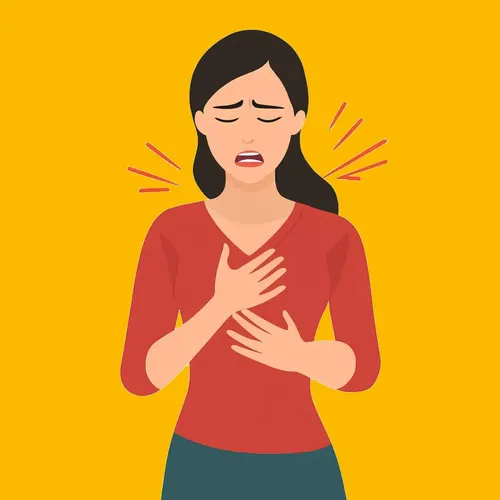Ever felt a squeezing sensation in your chest that left you breathless and worried? You might’ve experienced angina. Let’s dive into this common heart condition and explore what it means for your health.
What’s Angina, Anyway?
Imagine your heart as a bustling city, with coronary arteries serving as its main highways. When these arteries narrow due to fatty build-up (hello, atherosclerosis!), it’s like rush hour traffic jamming up those roads. Your heart muscle screams for more oxygen, and that’s when angina strikes.
This chest discomfort isn’t just limited to your ticker, though. It might radiate to your arms, jaw, or even your back. And let’s not forget the shortness of breath that often tags along – it’s like your body’s own personal panic button.
The Culprits Behind the Curtain
Why does angina happen? Well, it’s not just one villain in this story. High blood pressure, diabetes, and high cholesterol are often the usual suspects. But don’t forget about lifestyle choices – smoking, being a couch potato, or carrying extra weight can all contribute to the problem.
And here’s a fun fact: being male or getting older puts you at higher risk. It’s like your heart’s playing a game of Russian roulette, and these factors are loading extra bullets into the chamber.
Spotting the Signs: It’s Not Always Black and White
Chest pain is the star of the show when it comes to angina symptoms. But it’s not always a clear-cut case. You might feel like there’s an elephant sitting on your chest, or like someone’s giving your heart a bear hug.
The tricky part? These symptoms can mimic a heart attack. So if you’re sitting there wondering whether to call 999 or not, here’s a tip: if the pain doesn’t scram after a few minutes, it’s time to get help. Better safe than sorry, right?
Diagnosing the Drama: What to Expect
If you’ve made it to the doctor’s office, kudos to you for taking charge of your health! Your doc will likely play detective, asking about your symptoms, lifestyle, and family history. They might also order some tests – think blood work, ECGs, or even some fancy imaging like CT scans or MRIs.
Don’t be surprised if you end up getting referred to a cardiologist. These heart specialists have tricks up their sleeves to figure out what’s going on in your ticker.
Taking Control: Your Action Plan
Now, don’t let angina get you down. There’s plenty you can do to keep it in check:
- Always keep your meds handy – especially that trusty GTN spray or tablets.
- Learn your triggers and plan around them. If sprinting for the bus always sets off your angina, maybe it’s time to leave a few minutes earlier?
- Kick the smoking habit to the curb. Your heart (and lungs) will thank you.
- Get moving! But chat with your doc first about safe ways to break a sweat.
- Embrace a heart-healthy diet. Think less fast food, more fresh veggies.
Treatments: More Than Just Pills
While medications like GTN, aspirin, or statins often play a starring role in managing angina, sometimes they need a supporting cast. If meds aren’t cutting it, your doc might suggest some surgical interventions.
Angioplasty, for instance, is like sending a tiny plumber into your arteries to clear out the gunk. And for those tough cases, a coronary artery bypass graft (CABG) might be on the cards – think of it as creating a detour around the blocked artery.
Living Life to the Fullest with Angina
Having angina doesn’t mean your life’s over. With the right management, you can still live a vibrant, active life. Sure, you might need to make some tweaks – like checking with your doc before jetting off on vacation or getting behind the wheel. But these are small prices to pay for keeping your heart happy and healthy.
Remember, angina is your heart’s way of waving a red flag. Pay attention to it, work with your healthcare team, and you’ll be well on your way to keeping your ticker in tip-top shape. After all, your heart’s been beating for you since before you were born – isn’t it time you returned the favour?
Photo “Angina” by Anthony Cunningham for Zoom Health
Zoom Health is a leading UK supplier of Home Health Tests and Earplugs





